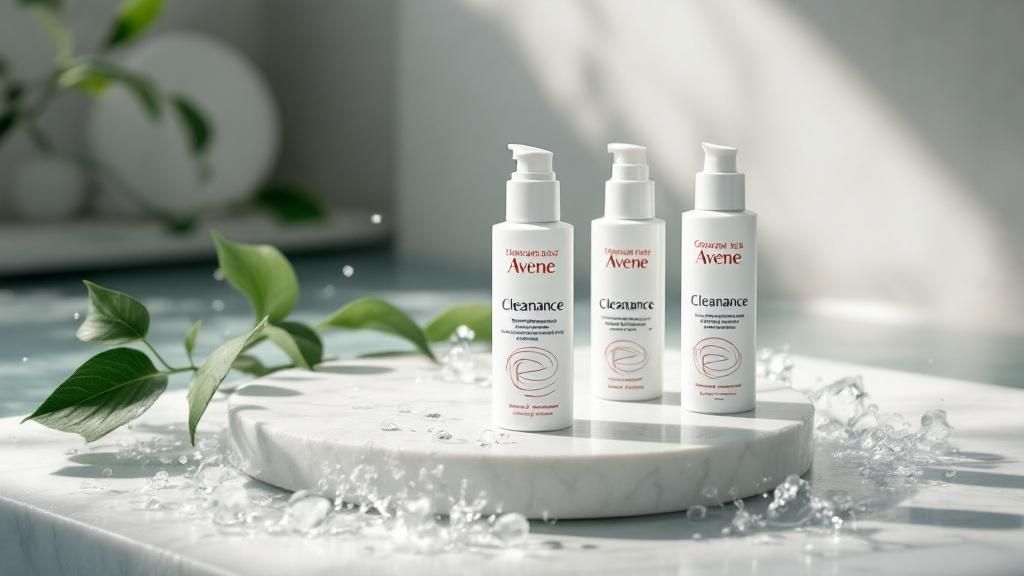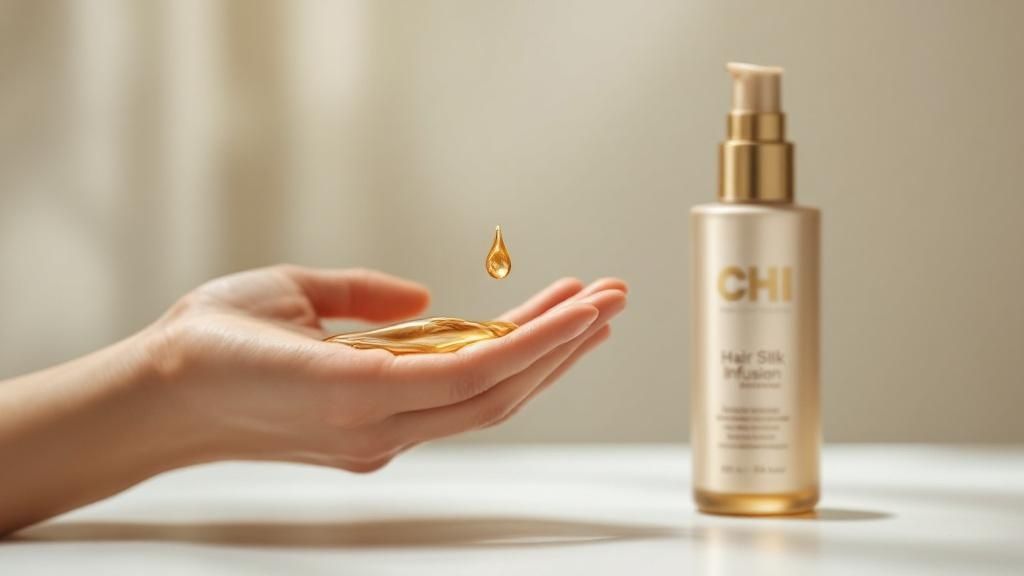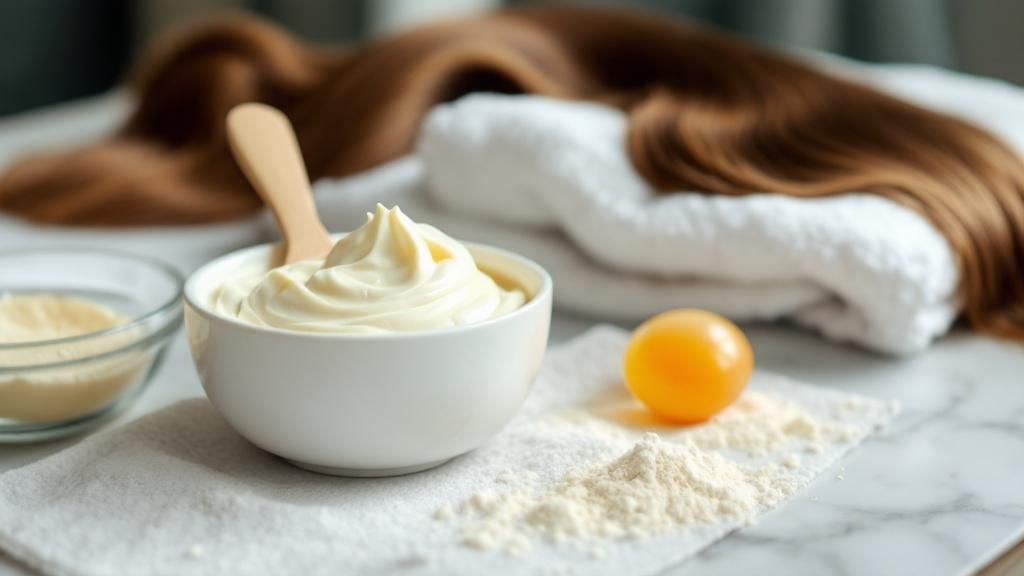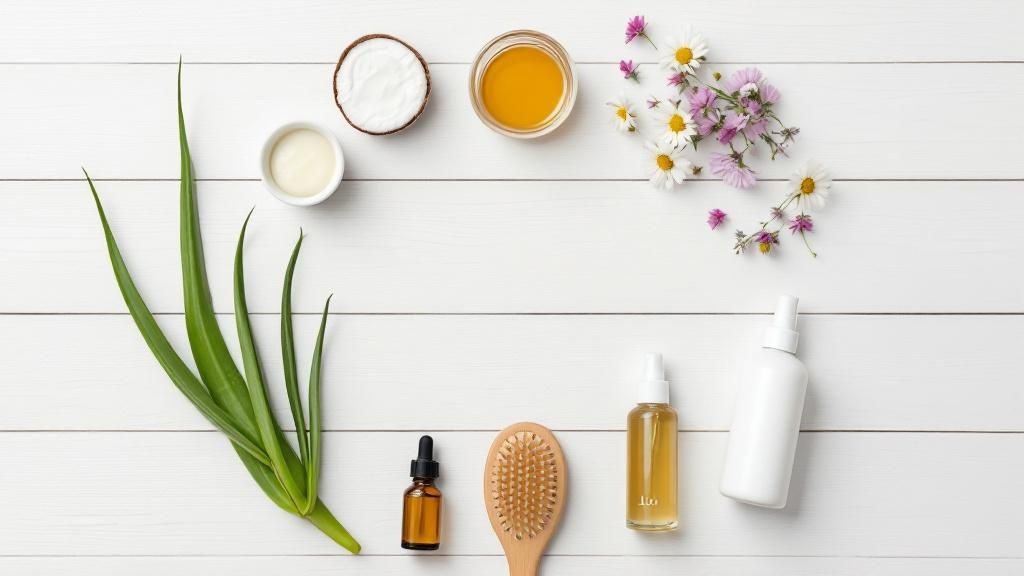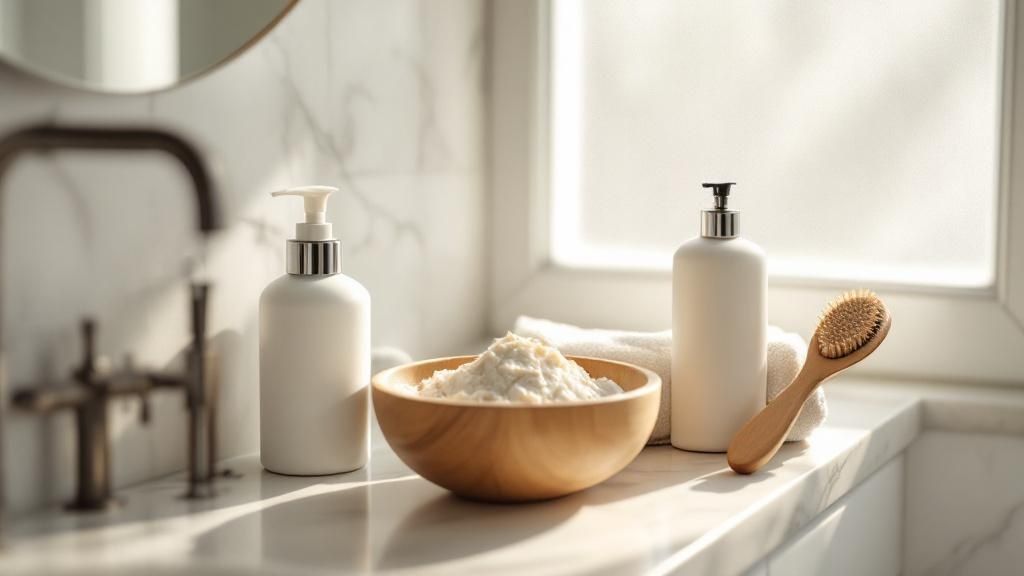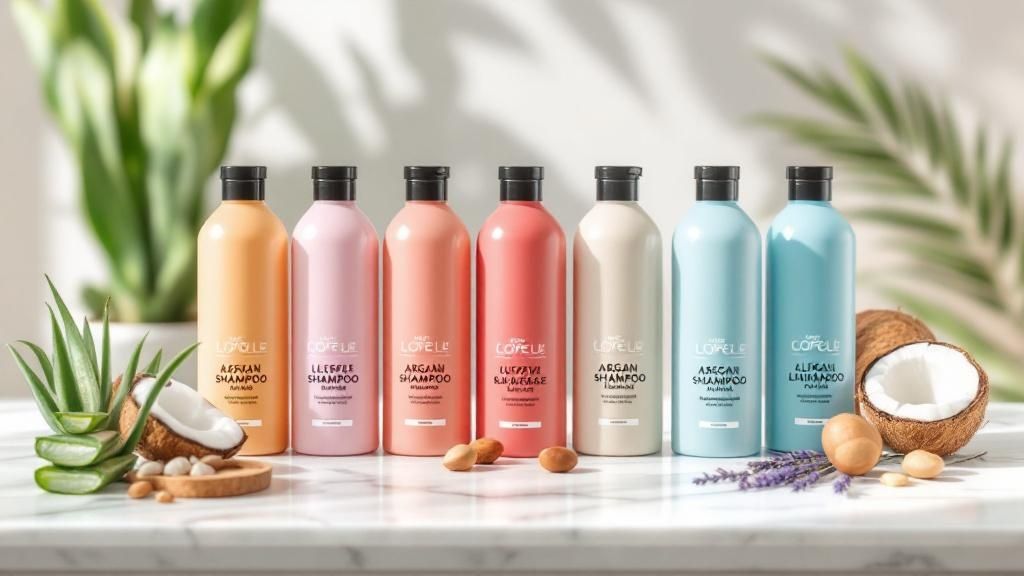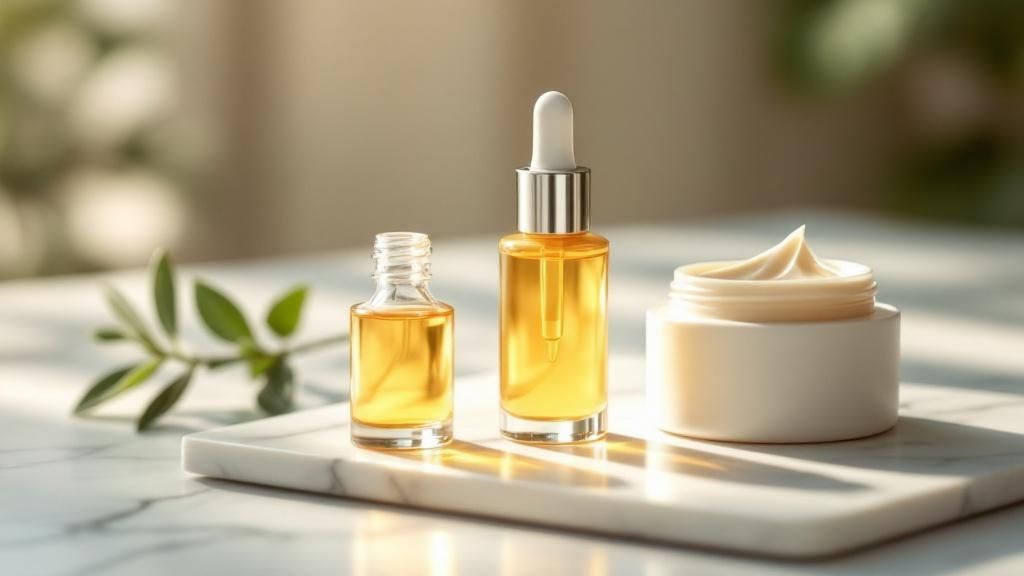
Discover the Best Anti Aging Skin Care Routine for Youthful Skin
The secret to a truly effective anti-aging skincare routine isn't a bathroom counter cluttered with a dozen products. It all comes down to a simple, consistent rhythm: protect your skin during the day and repair it while you sleep.
For your morning routine, the essentials are a gentle cleanser, a powerful antioxidant serum, a good moisturiser, and a broad-spectrum sunscreen. No compromises on that last one. At night, the focus shifts to cleansing away the day, using a targeted treatment like a retinoid, and finishing with a nourishing moisturiser to help your skin regenerate.
Your Essential Anti-Aging Routine
Before you even think about adding extras, it's vital to get the fundamentals right. This core framework is your non-negotiable strategy for tackling the common signs of aging like fine lines, dullness, or a loss of firmness. I've seen it time and time again: the real magic isn't in a complicated, 20-step ritual but in consistently using the right types of products at the right times.
Your skin has very different jobs to do in the morning compared to the evening. Daytime is all about defence against things like UV rays and pollution. Night, on the other hand, is when your skin goes into full-on repair mode, making it the ideal time for those potent, restorative ingredients to get to work.
Your Shield and Your Repair Crew
A great way I explain this to clients is to think of your morning routine as your "Shield" and your evening routine as your "Repair Crew." Each has a distinct role, and they work together for the best results.
-
Morning (The Shield): The main goal here is defence. You’re cleansing away sweat and oils from the night, fighting off environmental damage with an antioxidant, locking in hydration, and—most importantly—protecting your skin from the sun with a high-quality SPF.
-
Evening (The Repair Crew): After a long day, it’s time to thoroughly cleanse, then apply active ingredients that speed up cell turnover and kick-start collagen production. You follow that with a rich moisturiser to support your skin's natural overnight healing process.
This visual breaks down the core morning steps into a simple, easy-to-follow process.
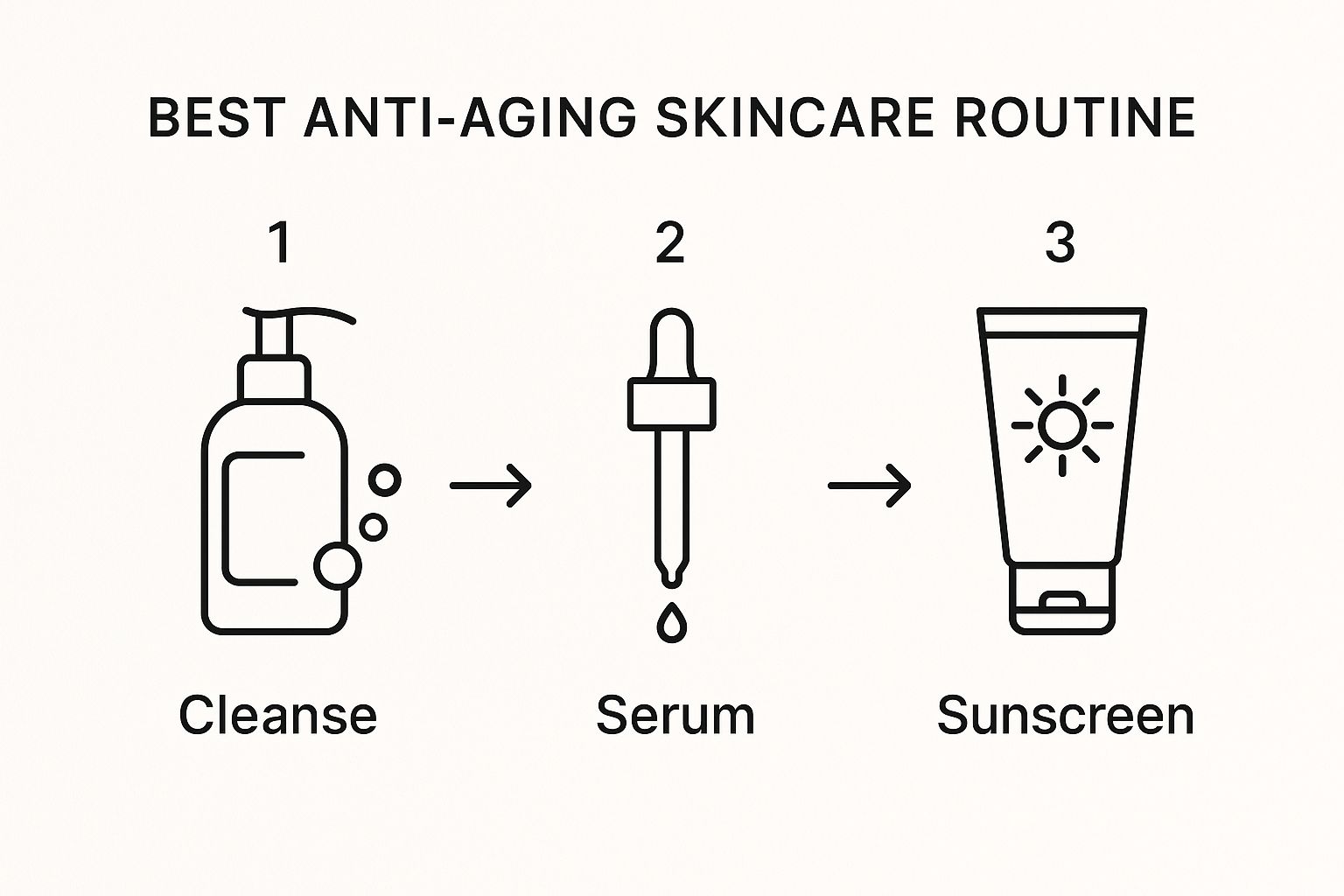
As you can see, a powerful defensive routine really only needs a few key steps, which makes it so much easier to stick with.
Tailoring to Your Climate and Skin
Of course, where you live and your skin type matter. For example, dermatological studies often highlight that Egyptian skin, typically a type III-IV on the Fitzpatrick scale, can show signs of aging earlier due to intense sun exposure and environmental pollutants.
Based on my experience, I always recommend a routine for this environment that prioritises diligent sun protection with at least SPF 30+, an antioxidant serum every single morning to combat free radical damage, and a retinoid-based product at night to really boost collagen. You can actually see these expert recommendations reflected in current skincare market trends.
The best simplified skincare routine is one that supports your skin’s natural barrier while addressing your core needs—and nothing more. A truly effective minimal routine consists of only three steps: cleanse, treat, and protect.
To simplify this even further, here's a quick cheat sheet for your core routine.
Core Anti-Aging Routine At a Glance
This table breaks down the essential steps for morning and evening, outlining their purpose and the powerhouse ingredients to look for.
| Time | Step | Purpose | Key Ingredients |
|---|---|---|---|
| Morning | 1. Cleanse | Remove overnight impurities | Gentle surfactants, Glycerin |
| Morning | 2. Antioxidant Serum | Protect from free radical damage | Vitamin C, Vitamin E, Ferulic Acid |
| Morning | 3. Moisturise | Hydrate and support skin barrier | Hyaluronic Acid, Ceramides, Peptides |
| Morning | 4. Sunscreen | Prevent UV damage and photoaging | Zinc Oxide, Titanium Dioxide, Avobenzone |
| Evening | 1. Cleanse | Remove makeup, SPF, and pollutants | Cleansing oils, gentle foaming agents |
| Evening | 2. Treatment | Stimulate collagen, increase cell turnover | Retinoids (Retinol, Tretinoin), AHAs |
| Evening | 3. Moisturise | Deeply nourish and aid overnight repair | Rich emollients, Niacinamide, Shea Butter |
By mastering these foundational steps, you build a solid base. From there, you can start to customise your routine with other treatments for your specific concerns, knowing you've already got the most important parts covered.
Your Morning Ritual for All-Day Skin Defence
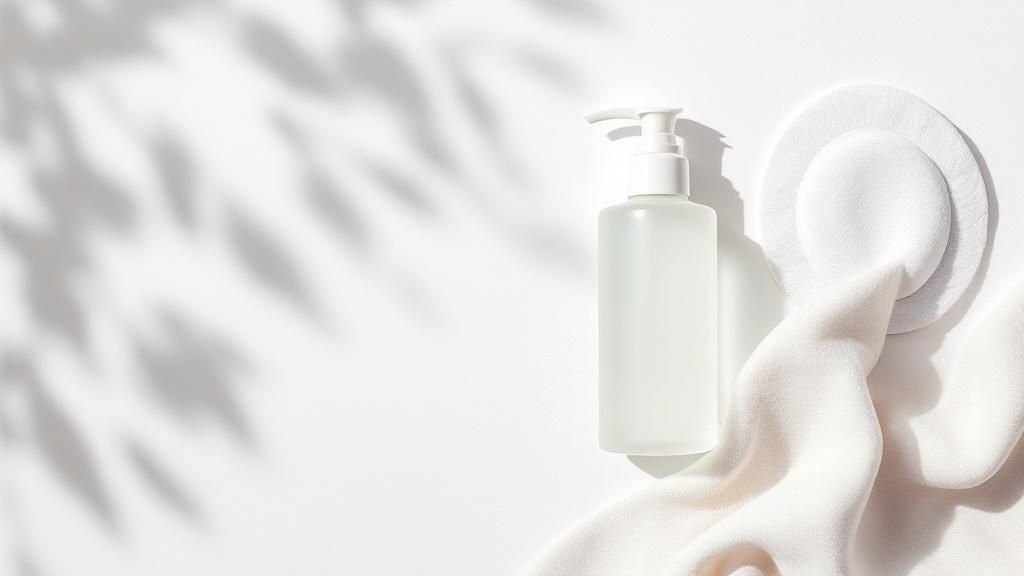
While your evening routine is all about repair and recovery, your morning skincare is your shield. It's about building a robust defence against the environmental attacks—like UV radiation and pollution—that our skin faces every single day. These aggressors are responsible for a huge chunk of visible skin ageing, so a solid morning ritual really sets the stage for healthier, more resilient skin.
It all begins the moment you step in front of the mirror.
Start with a Gentle Cleanse
The first thing to do is cleanse, but your morning wash has a completely different job than your nightly one. You’re not trying to dissolve heavy makeup or a day’s worth of grime. Instead, you're simply rinsing away the sweat, excess oil, and any skin cells that have shed overnight.
This is why a harsh, stripping cleanser is the last thing you want. As our skin matures, it naturally produces less oil and can become drier. Using a strong cleanser first thing can disrupt your delicate skin barrier, leading to irritation and redness before your day has even properly started.
Instead, reach for a gentle, hydrating cleanser. Look for formulas with ingredients like glycerine or hyaluronic acid, which clean beautifully without sapping essential moisture. A milky, creamy, or low-foaming gel cleanser is often the perfect choice, leaving your skin feeling soft and ready for what comes next.
Unleash Antioxidant Power
After cleansing comes what I consider the most important step for daytime defence: an antioxidant serum. Think of antioxidants as your skin's personal bodyguards. They work tirelessly to neutralise unstable molecules called free radicals, which are generated by things like UV rays and pollution. Left unchecked, these molecules attack your skin's collagen and elastin, paving the way for wrinkles and sagging.
The absolute gold standard antioxidant for any morning routine is Vitamin C, specifically L-ascorbic acid. It’s a true multitasker that not only protects your skin but also brightens your complexion and encourages collagen production over time.
For even better protection, find a serum that combines Vitamin C with a few other key players.
- Vitamin E: This antioxidant works hand-in-hand with Vitamin C, helping to stabilise it and boost its protective power.
- Ferulic Acid: Another powerhouse, ferulic acid enhances the stability and effectiveness of both Vitamin C and Vitamin E. This trio offers exceptional defence.
When you apply an antioxidant serum in the morning, you’re essentially supercharging your sunscreen and giving your skin a fighting chance against daily environmental damage.
Target and Hydrate Specific Areas
Not all the skin on your face is the same. The skin around your eyes, for example, is significantly thinner and more delicate than elsewhere, which is why it’s often the first place to show fine lines or signs of a late night.
This is where a dedicated eye cream comes into play. While you could technically just use your regular moisturiser, eye creams are specifically formulated to be gentle yet effective for this fragile area. Look for ingredients like peptides to support firmness or caffeine to help with any morning puffiness.
After your eye cream, it's time to moisturise your entire face. A good moisturiser does more than just hydrate; it creates a seal, locking in your serum and reinforcing your skin's natural barrier. The best texture for you really depends on your skin type.
- For Oily or Combination Skin: A lightweight, oil-free gel or lotion will provide hydration without feeling heavy or greasy.
- For Dry or Mature Skin: A richer cream containing ceramides, shea butter, or peptides will deliver more intense nourishment and help plump the skin.
Expert Tip: Always apply your skincare from the thinnest to the thickest consistency. That means your watery serum goes on first, followed by your slightly thicker eye cream, and finally your richer moisturiser. This layering technique ensures each product can penetrate the skin properly without being blocked by a heavier one.
The Non-Negotiable Final Step: Sunscreen
If you only do one thing for your skin, make it this. Sunscreen, every single day, without fail. As much as 80% of visible skin ageing is caused by sun exposure—a process known as photoageing. Without daily sun protection, every other product you’ve just applied is fighting a losing battle.
This isn't just a recommendation; it's a globally recognised practice. For example, in sun-drenched regions, dermatology clinics across Egypt consistently champion comprehensive routines that always finish with diligent sun protection to combat the effects of strong, year-round sun. This full approach—cleansing, serums, moisturising, and sun protection—is considered the best way to slow the signs of photoageing. You can read more about these regional anti-aging cosmetic trends and findings.
When you're choosing a sunscreen, make sure it offers:
- Broad-Spectrum Protection: This is crucial. It means the product shields you from both UVA (ageing) and UVB (burning) rays.
- SPF 30 or Higher: This is the minimum level dermatologists recommend for effective daily protection.
You'll come across two main types: mineral (or physical) and chemical. Mineral sunscreens use ingredients like zinc oxide and titanium dioxide to sit on the skin's surface and physically block rays. Chemical sunscreens work by absorbing UV radiation and converting it into heat. Honestly, many of the best modern formulas are 'hybrids' that contain both, offering elegant and effective protection. The key is to find one you genuinely love to wear—your skin will thank you for decades to come.
The Nighttime Routine for Repair and Regeneration
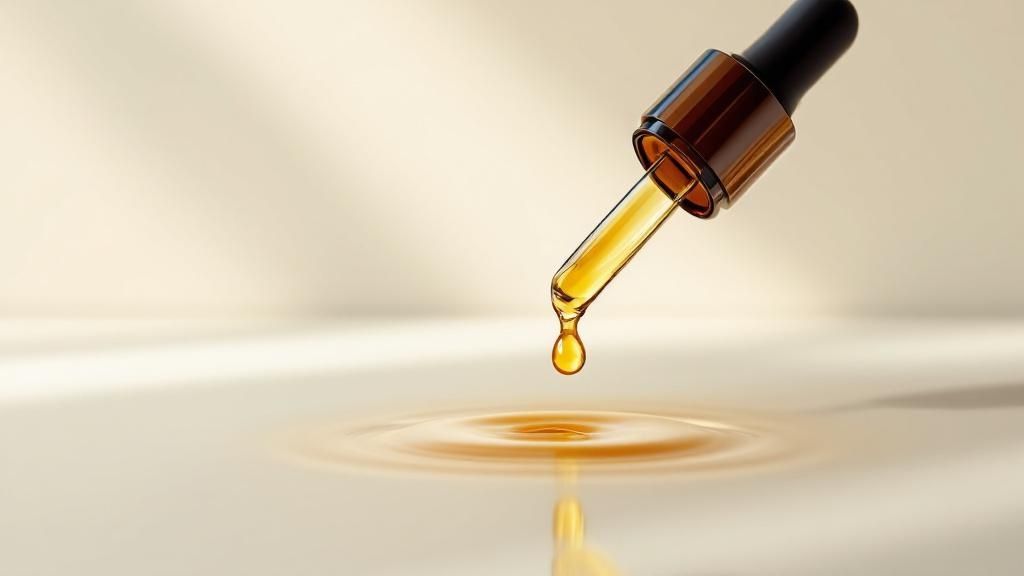
As the sun sets, your skin’s real work begins. Night isn’t just for rest; it’s a critical period of intense repair and regeneration. If your morning routine is a shield against the day, think of your evening ritual as the dedicated repair crew, working hard to undo damage and prep your skin for a fresh start. Building the best anti-ageing skincare routine means truly making the most of this crucial window.
This is all about creating the perfect environment for your skin to heal itself. We’ll start by thoroughly removing the day's grime—pollutants, sunscreen, and makeup—then follow up with powerful ingredients that accelerate cell renewal and boost collagen. Let's map out your ultimate nighttime plan.
The Power of the Double Cleanse
Before any serum or cream can work its magic, you have to begin with a completely clean canvas. From my experience, a single wash often isn't enough, especially if you wear makeup or a resilient, long-lasting sunscreen. This is where the double cleanse technique becomes a total game-changer.
First up is an oil-based cleanser. Like attracts like, so this initial cleanse is incredibly effective at melting away everything sitting on your skin's surface. We're talking foundation, mascara, excess sebum, and the day's pollution, all without stripping your skin's natural moisture. You simply apply it to dry skin, massage it in, and then add a little water to emulsify before rinsing it all away.
Then, you follow up with a gentle, water-based cleanser (like a gel or cream formula). This second wash removes any leftover impurities and residue from the oil cleanse, ensuring your pores are perfectly prepped for the active ingredients to come.
Introducing the Anti-Ageing Champion: Retinoids
With your skin impeccably clean, it's time to bring in the undisputed gold standard of anti-ageing ingredients: retinoids. This family of vitamin A derivatives is backed by decades of solid scientific evidence for its ability to truly transform skin. They work by binding to receptors in your skin cells, essentially telling them to behave like younger, healthier cells.
This cellular communication leads to some incredible benefits:
- Accelerated Cell Turnover: Retinoids speed up how quickly your skin sheds old, dull cells and replaces them with fresh, new ones. The result is a smoother, more radiant complexion.
- Collagen Stimulation: They are proven to kick-start the production of collagen—the protein that gives skin its firmness and structure—which helps to soften the appearance of fine lines and wrinkles over time.
- Improved Skin Texture: By promoting new cell growth and unclogging pores, retinoids can refine skin texture and even help with concerns like acne.
For a comprehensive guide on adding these powerful products into your regimen, you can explore our detailed breakdown of the ideal nighttime skincare routine steps to make sure you get the most out of every application.
Expert Tip: The Sandwich Method If you're new to retinoids or have sensitive skin, the "sandwich method" is a brilliant way to start. Apply a thin layer of a simple moisturiser first and let it absorb. Then, apply your retinoid, and finish with another layer of moisturiser. This creates a buffer that helps minimise potential irritation and dryness as your skin adapts.
Gentle Alternatives for Sensitive Skin
While retinoids are incredibly effective, they aren't the right fit for everyone. Some people find them too irritating, particularly those with very sensitive skin or conditions like rosacea. Thankfully, there are powerful alternatives that can still deliver remarkable anti-ageing results.
Two of the best options are:
- Peptides: These are short chains of amino acids that act as building blocks for proteins like collagen and elastin. Think of them as messengers that signal your skin to produce more of these crucial structural components, leading to firmer, plumper skin.
- Bakuchiol: This plant-derived ingredient is often called a natural alternative to retinol. Studies have shown it can provide similar benefits—like improving fine lines, pigmentation, and elasticity—but with a much lower risk of irritation. It's an excellent choice for sensitive complexions.
Strategic Exfoliation with AHAs
Exfoliation is another key part of a regenerative nighttime routine, but it requires a careful, strategic approach. Over-exfoliating can damage your skin barrier, so this is definitely not a nightly step. Instead, think of it as a weekly or bi-weekly treatment to boost your results.
Alpha-hydroxy acids (AHAs) like glycolic acid and lactic acid are fantastic for this. They work by dissolving the "glue" that holds dead skin cells to the surface, effectively sweeping them away to reveal brighter, smoother skin underneath.
A good rule of thumb is to use an AHA serum or toner 2-3 times per week, but only on nights when you are not using your retinoid. Alternating these potent ingredients prevents over-stressing your skin and allows each product to work effectively without getting in the other's way.
Lock It All In with a Nourishing Night Cream
The final, essential step of your nighttime routine is sealing everything in with a rich, nourishing moisturiser. A night cream is typically thicker and more emollient than its daytime counterpart, designed specifically to support your skin's overnight repair cycle.
Look for formulas packed with ingredients that replenish and restore the skin barrier.
- Ceramides: These are lipids that are a natural part of your skin barrier, helping it retain moisture and protect against daily stressors.
- Hyaluronic Acid: A powerful humectant that draws moisture into the skin, keeping it hydrated and plump.
- Niacinamide: A versatile B vitamin that helps calm inflammation, improve skin tone, and strengthen the barrier.
Applying a quality night cream ensures that the active ingredients from your treatment step stay locked in and your skin remains hydrated and comfortable all night long. It's the perfect finishing touch to a powerful repair ritual, ensuring you wake up to a smoother, healthier, and more youthful-looking complexion.
Decoding the Most Powerful Anti-Ageing Ingredients
Stepping into the world of skincare can sometimes feel like you're trying to learn a new language, can't it? With a seemingly endless list of active ingredients all promising to turn back the clock, it's tough to know which ones genuinely deliver. The key to building an anti-ageing routine that actually works for you is understanding the real power players.
Let's break down the science behind the most effective ingredients that dermatologists and skin experts swear by. Once you know what to look for, you'll be able to read any product label with confidence.
Retinoids: The Gold Standard
When it comes to scientifically-proven anti-ageing, retinoids are truly in a league of their own. This family of Vitamin A derivatives is, without a doubt, the most studied and proven ingredient for visibly dialling back the signs of ageing. Their magic lies in their ability to speed up skin cell turnover and kick collagen production into high gear.
So, what does that actually mean for your skin?
- A Smoother Surface: By helping your skin shed old, dull cells more efficiently, retinoids reveal the fresher, smoother skin hiding underneath.
- Fewer Wrinkles: They actively boost collagen—the protein that gives skin its firmness—which helps soften the appearance of fine lines over time.
- A More Even Tone: This ramped-up cell turnover is also fantastic for fading dark spots and hyperpigmentation.
A crucial tip: retinoids are strictly a nighttime affair, as they can make your skin more sensitive to the sun. If you have sensitive skin, start slow. Using a lower concentration just a few times a week and applying it with the "sandwich method" (moisturiser, retinoid, then more moisturiser) is a brilliant way to get all the benefits without the irritation.
Vitamin C: The Protective Powerhouse
If retinoids are your nighttime repair crew, then Vitamin C is your ultimate daytime defender. This potent antioxidant is an absolute non-negotiable for a protective morning routine. It works by neutralising free radicals—those nasty, unstable molecules from UV rays and pollution that chew up your collagen and speed up the ageing process.
Beyond just protection, Vitamin C is a star at brightening your overall complexion and can even enhance your sunscreen's effectiveness. For the biggest impact, look for serums containing L-ascorbic acid, especially when it’s paired with Vitamin E and Ferulic Acid. This specific combination is known to make it much more stable and powerful. To learn more about how this one ingredient can elevate your morning ritual, our guide on choosing a serum with vitamin c is a great place to start.
Think of it like this: Without an antioxidant serum in the morning, your skin is fighting off environmental attacks on its own. Adding Vitamin C is like giving your skin a shield, helping it preserve its youthful vitality for longer.
Hyaluronic Acid: The Hydration Magnet
Hyaluronic Acid (HA) is a substance our skin produces naturally to hold onto water, which is what keeps our complexion hydrated, plump, and bouncy. What's incredible is that a single HA molecule can hold up to 1,000 times its weight in water, making it a true moisture magnet.
As we get older, our natural HA levels start to drop, leading to dryness, fine lines, and a loss of that youthful bounce. Adding a Hyaluronic Acid serum to your routine gives your skin an instant flood of hydration, which helps to:
- Visibly plump the skin, making fine lines look less obvious.
- Improve the skin's elasticity and bounce-back.
- Support a strong, healthy, and hydrated skin barrier.
Here's a pro tip from personal experience: pair your Hyaluronic Acid with a retinoid at night. Applying an HA serum before your retinol can help buffer the skin, counteracting the potential dryness that sometimes comes with Vitamin A and making your whole routine more comfortable and effective.
Peptides: The Cellular Messengers
Think of peptides as tiny little messengers for your skin. These are short chains of amino acids, which are the fundamental building blocks of proteins like collagen and elastin. When you apply certain peptides topically, they can actually signal your skin to produce more of these essential proteins.
This makes them a superb ingredient for tackling loss of firmness and elasticity. Peptides are also incredibly gentle, making them a fantastic alternative or a complementary partner to retinoids, especially for those with very sensitive skin.
Niacinamide: The Versatile Multitasker
Niacinamide, a form of Vitamin B3, is the ultimate jack-of-all-trades in skincare. It’s so versatile and addresses such a wide range of concerns that it’s a valuable addition to pretty much any anti-ageing routine.
Just look at what it can do:
- Strengthens the skin barrier: It helps your skin produce more of its own ceramides.
- Improves skin tone: It can calm down redness and blotchiness for a more even complexion.
- Minimises pores: It helps regulate oil production, which can make pores appear smaller over time.
Because it's so calming, Niacinamide plays beautifully with stronger actives like retinoids and AHAs, helping to keep your skin happy.
Comparing Top Anti-Aging Ingredients
To help you decide which of these power players is right for your skin's needs, here’s a quick reference guide. It compares their main job, what they're best for, and when you should use them in your routine.
| Ingredient | Primary Function | Best For | Use In Routine (AM/PM) |
|---|---|---|---|
| Retinoids | Increases cell turnover, boosts collagen | Fine lines, wrinkles, uneven texture | PM Only |
| Vitamin C | Antioxidant protection, brightens skin | Dullness, environmental damage | AM Only |
| Hyaluronic Acid | Deeply hydrates and plumps skin | Dehydration, fine lines, all skin types | AM and/or PM |
| Peptides | Stimulates collagen for firmness | Loss of elasticity, sagging | AM and/or PM |
| Niacinamide | Calms, strengthens barrier, refines pores | Redness, large pores, sensitive skin | AM and/or PM |
By understanding what these hero ingredients do, you're no longer just guessing. You can confidently pick products that target your specific concerns and finally build the best anti-ageing skincare routine for visible, lasting results.
Lifestyle Habits That Impact How Your Skin Ages
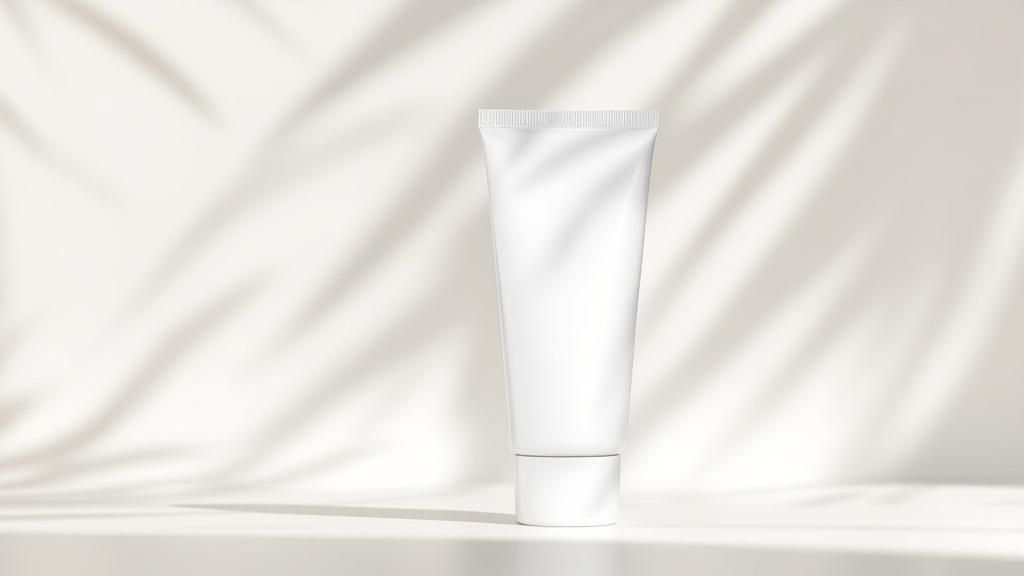
Let's be honest: even the most luxurious serums and creams can only do so much on their own. The secret to truly effective anti-ageing skincare isn’t just about what you put on your face; it's a routine that works from the inside out, pairing fantastic products with healthy habits. Your daily choices have a profound and direct impact on your skin, often speeding up or slowing down the ageing process far more than you might realise.
A well-thought-out skincare routine is clearly a priority for many. In fact, research in Egypt shows that over 65% of women aged 40 and above consider preventing wrinkles and fine lines a crucial part of their daily care. If you're interested in the details, you can explore the full research on the anti-ageing products market.
This focus really drives home the need for a holistic approach. When you understand how different lifestyle factors affect your skin, you can make smarter choices that boost your routine’s power and help you achieve a genuine, lasting radiance.
The Impact of Diet on Your Skin
What you eat shows up on your skin—it's as simple as that. A diet heavy in processed foods and refined sugar can kickstart a destructive process known as glycation. This is where excess sugar molecules latch onto vital proteins like collagen and elastin, forming harmful compounds that make these fibres stiff, brittle, and weak.
Essentially, glycation dismantles your skin's support structure from within, which leads to more noticeable wrinkles and sagging. The good news? You can fight back. A diet packed with antioxidants from colourful fruits and vegetables helps combat this damage. Think of berries, leafy greens, and nuts as your internal skincare army, defending your skin against the free radicals that accelerate ageing.
The Critical Roles of Hydration and Sleep
Staying hydrated is fundamental for plump, elastic skin. When your skin is dehydrated, it can look dull and make fine lines appear much more prominent than they actually are. Drinking enough water is the baseline, but you can also eat your water through foods like cucumber and watermelon. For an external boost, our guide on Hyaluronic Acid serum benefits explains how this amazing ingredient locks moisture into the skin.
Sleep is just as critical. While you're in a deep sleep, your body's repair mechanisms go into overdrive. This is when your skin ramps up collagen production, mends damage from UV exposure, and calms inflammation. Skimping on sleep consistently throws a wrench in these essential processes, leading to a tired complexion, dark circles, and a compromised skin barrier.
Key Takeaway: Think of sleep as the time your skin’s "repair crew" gets to work. Skimping on sleep is like telling the crew to take the night off—the damage from the day doesn't get properly fixed, and it shows on your face over time.
How Stress and Other Habits Affect Ageing
Chronic stress is one of the biggest culprits behind premature ageing. It floods your body with cortisol, a hormone that actively breaks down collagen and elastin. This constant state of stress-induced inflammation can also trigger flare-ups of acne and eczema, contributing to a stressed, aged appearance.
Finally, certain habits can be incredibly damaging to your skin's health and appearance.
- Smoking: It constricts your blood vessels, starving your skin of the oxygen and nutrients it needs to thrive. It also introduces thousands of chemicals that actively destroy your collagen.
- Alcohol: This dehydrates your entire body, including your skin, and can cause inflammation and redness that leaves you looking tired and older.
By combining a brilliant skincare routine with mindful lifestyle choices, you create a powerful synergy for ageless, healthy-looking skin.
Your Anti-Ageing Skincare Questions, Answered
Even with the best instructions, diving into an anti-ageing routine can bring up a lot of questions. It's only natural to wonder if you're getting the order right or if a particular product is truly necessary for your skin.
Let's clear up some of the most common things people ask. Getting these details right is often what turns a skincare routine from a chore into a confident, effective ritual you can look forward to.
When Should I Actually Start an Anti-Ageing Routine?
This is easily the question I hear most often, and the answer is probably simpler than you think. It all comes down to prevention. Most dermatologists I've worked with suggest that your mid-to-late 20s is the perfect time to start incorporating some targeted anti-ageing steps.
Of course, the most crucial "anti-ageing" product of all is sunscreen, and that should start as early in life as you can manage. But if you're in your 20s, adding an antioxidant serum like Vitamin C to your morning is a fantastic first step. Once you hit your early 30s, introducing a gentle retinoid at night can make a huge difference down the line.
How Long Until I See a Real Difference?
Ah, the million-dollar question! While your skin might feel more hydrated and look a bit brighter within a week or two, the real, lasting changes take time. You have to be patient.
For active ingredients like retinoids and peptides to visibly reduce fine lines, improve firmness, and refine texture, you need to stick with them. It generally takes at least three to six months of consistent, daily use to see significant results. Consistency is everything; these ingredients need time to work their magic.
The biggest mistake I see is people giving up too soon. Your skin needs to go through several full cellular turnover cycles to reveal the benefits of new active ingredients. Give any new product at least three months before you decide if it's working for you.
Can I Use Vitamin C and Retinol Together?
Yes, you absolutely can, and you should! They are a dream team for tackling signs of ageing. The trick is to use them at different times of the day to let each one do its job properly.
- Vitamin C in the Morning: Think of Vitamin C as your daytime shield. Apply it after cleansing in the AM. Its antioxidant power helps protect your skin from pollution and UV damage you encounter throughout the day.
- Retinol at Night: Retinol is for your night shift. It gets to work repairing and regenerating skin cells while you sleep. Since it can make your skin more sensitive to the sun, applying it in the evening is always the safest bet.
Is a Separate Eye Cream Really Necessary?
This is a great question, and honestly, it depends. It's not a must-have for everyone, but there are some solid reasons to use one. The skin around your eyes is the thinnest and most delicate on your entire body, which is why it's often the first place to show fine lines or fatigue.
Eye creams are specifically formulated for this fragile area. They typically have lower concentrations of potent ingredients to avoid irritation and are often packed with extras to tackle specific concerns like puffiness and dark circles in a way your standard face cream might not.
Ready to build a routine with products that deliver? Explore the curated selection of authentic, expert-approved skincare at lo.la and find targeted solutions for every concern. Discover your new favourites today at https://www.lolabeautyshop.com.










